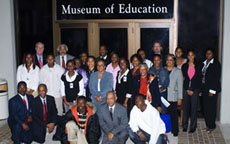

Curator's Statement |
||||||||||
|
“Southern gave me an awesome education in that the teachers prepared me to be anything I wanted to be after high school. The school taught us the rite of passage (order to live by in sequence). We came as children, and they taught us to be girls in preparation for womanhood. As a result we developed a sense of order. All of their teachings were important to us and were well planned. They taught us how to focus, and we would eventually become confident adults who would make positive contributions to society.” Julia Bradford Moore |
|||||||||
No training in oral history interviewing would have prepared me for certain sessions at my Southern University site visit with graduates of the Demonstration School. And in many respects the sessions—filled with joy, honest critique, laughter, and some rage—could have come about only because, as Julia Bradford Moore notes, the lab school faculty taught the students to become confident adults. Only a group of women with great confidence would discuss and introduce me to the nuance of passe blanc and what this meant within the context of 1930s and 1940s schooling. The forthright and candid comments, filled with thoughtfulness and wisdom, provided me new perspectives on the role of black progressive education at a demonstration school. |
||||||||||
 with Sedonia C. Johnson |
The success of this research was made possible through the assistance and hard work of Sedonia C. Johnson who coordinated my site visit. I had so much fun chatting with her and her son—the political developments of the day provided much to discuss. And my trip to Scotlandville proved so memorable with my visit to Lena Armstead's kitchen where I delighted in learning of (and tasting!) her culinary treats. As I now recall the joyous aspects of my stay in Scotlandville, I have found myself overcome with emotion as I think back to the dignity, care, and love that each alumni displayed for their school. I never thought I would become teary-eyed while sizing photographs in Dreamweaver for this exhibition, but I often found myself in tears as I re-read the comments. |
|||||||||
This site introduces visitors to the Demonstration School activities of the 1940s but, also, serves to give notice to all students of the 1940s—your story remains untold. So much remains to be learned from the elementary and secondary school core programs. I hope to return to Southern University for further archival study and, of course, I will certainly wish to reconvene another gathering of students so that they may discuss any topic they wish and, in so doing, display the glories of progressive education in black high schools of the South. Craig Kridel |
||||||||||

an institutional member of the International Coalition of Sites of Conscience
Museumofed@gmail.com


